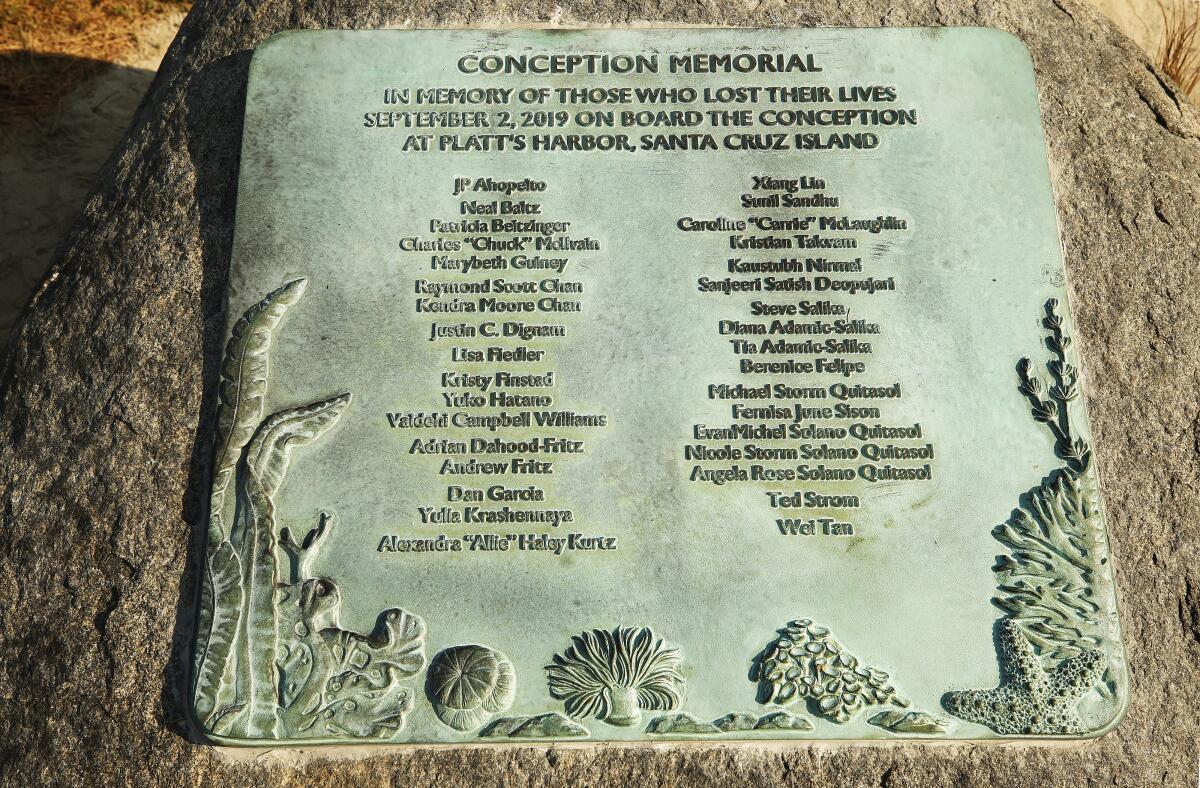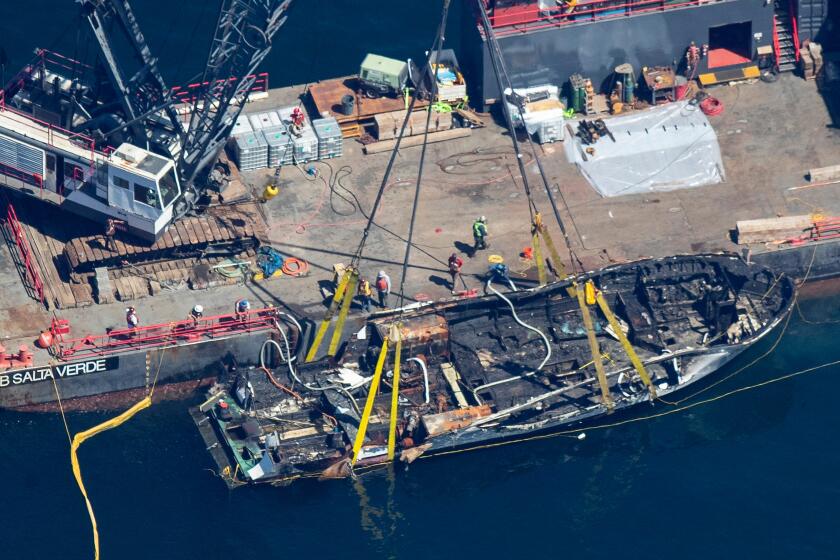Feds say captain saved himself as California boat fire killed 34. But prosecution hits a wall

- Share via
Three years have passed since Captain Jerry Boylan jumped overboard from the Conception dive boat as it was swallowed by flames that killed 34 people onboard off the Channel Islands.
Federal prosecutors say flames engulfed the middle deck and went undetected for several minutes because Boylan did not operate a required roving watch. They claimed he saved himself “rather than attempting to save the 33 passengers and one crewmember who were still alive in the ship’s bunkroom” below deck.
But criminal prosecution of the worst maritime disaster in modern California history has taken an unexpected turn.
U.S. District Judge George Wu said Thursday he would dismiss Boylan’s indictment as defective because prosecutors used “negligence” instead of “gross negligence” in their presentation to the grand jury.
A commercial diving boat caught fire near the shoreline of Santa Cruz Island, Calif., early Monday. Many aboard the boat were believed to be sleeping below deck when the fire broke out in the pre-dawn hours.
Federal prosecutors vow to appeal, but families of the Conception victims are expressing outrage over the drawn-out process in the manslaughter case.
“It is like reliving that day over and over,” said Kathleen McIlvain, whose son, Charles McIlvain, a 44-year-old visual effects designer, was among the 33 passengers killed below deck shortly after 3 a.m. on Sept. 2, 2019. “We are all in disbelief.”
McIlvain and other families listened in to a hearing via Zoom in Boylan’s case before making their way early Friday to the memorial placard at the Santa Barbara sea wall or, in some cases, diving in the spot the Conception sank off Santa Cruz Island.
Assistant U.S. Atty. Mark Williams told Wu in that hearing that if he required gross negligence and made that final ruling, the government would immediately appeal to the 9th Circuit Court of Appeals. The judge’s final decision on Friday to dismiss the indictment without prejudice means federal prosecutors can refile the case but they will need to show gross negligence, a much harder standard to convict the captain.
“The United States Attorney’s Office will seek authorization from the Justice Department to appeal this order,” Thom Mrozek, a spokesman for the office, said Friday.
Negligence amounts to careless mistakes or breaches of duty. In contrast, gross negligence requires that a prosecutor show a deliberate and reckless disregard for the safety or lives of others, and it must be wanton and willful.
“Your honor, it would be unprecedented in the 200-year history of the statute if anything other than ordinary negligence standard was applied,” Williams, the lead prosecutor, told the judge. He noted that seaman’s manslaughter is not the actual statute title, which is “misconduct of ship’s officers,” and that the whole point of the law is on the seas captains are responsible for everyone’s life on board.
Historically, legal experts say seaman’s manslaughter, unlike common law manslaughter, which requires a mental state of gross negligence, only requires simple negligence — an omission in violation of a standard of care. It has long been the lower standard of proof for a fatal case in the federal system.
Seaman’s manslaughter was enshrined after steamboat disasters killed hundreds of people in fires and boiler explosions. In 1838, Congress approved legislation that captains and crew could be criminally liable if anyone on the vessel died due to their misconduct, negligence or inattention to duties. The penalty is up to 10 years in prison.
But Wu agreed with a team of top federal public defenders representing Boylan and wrote in a decision that if the gross negligence standard applied to the regular involuntary manslaughter statute, it should apply in versions for the seas.
“It is difficult for this Court to understand why gross negligence would be required for an involuntary manslaughter conviction under Section 1112 but not for a conviction under Section 1115. Neither statute facially requires gross negligence, but common-law understandings incorporate that requirement into an involuntary manslaughter charge under Section 1112,” Wu wrote.
Boylan had been scheduled to be tried next month. Even before the prospect of an appeal, his lawyers from the federal public defender’s office, citing more than 700,000 files from multiple federal investigations, wanted it delayed until May 2023.
His lawyers in court papers noted he was an employee of Truth Aquatics, the Conception’s owner, and that the National Transportation Safety Board cited the failure of the company and its owner to run a roving watch person whenever passengers were sleeping below deck as well as other safety procedures. The National Transportation Safety Board faulted Truth Aquatics for running a vessel with little or no oversight, which Truth Aquatics’ attorneys strongly deny.
During Thursday’s hearing, the judge and lead prosecutor both noted that another federal circuit, the 5th Circuit, had a ruling that held to the negligence standard on an appeal. If the 9th Circuit agrees with Wu, the Supreme Court could be asked to resolve the matter.
Loyola law professor Laurie Levenson, a former federal prosecutor, said, “this may seem frustrating for the victims’ families, but it is important that legal issues are sorted out before you go to trial. It is even more frustrating when it comes up on appeal after a trial.” She added, “This is something that is going to be reviewed by the Ninth Circuit.”
Levenson said when you have a statute with such harsh penalties — 10 years in federal prison — it seems Wu is saying it deserves more than the type of negligence that gets you sued. She said that common law has a high standard for manslaughter. “Even if a higher standard of gross negligence is applied given the extreme risks, in this case, prosecutors may succeed in making their case,” she added.
Boylan’s alleged actions — being asleep, not running a Coast Guard-required roving watch checking the 75-foot vessel, not ensuring his deckhands were trained to fight a fire, and his leaving the ship — could be shown to amount to gross negligence, she said.
Those sleeping below deck were trapped beneath the fire. There were signs that some of those who perished were awake with their shoes on before they were killed by smoke inhalation.
On Thursday, the captain again pleaded not guilty because of a new July superseding indictment for a single count of seaman’s manslaughter with 34 deaths.
Prosecutors in court filings say they were alive when Boylan jumped off the top deck and ran afoul of a sacred maritime tradition: that a captain should be the last to leave his ship. The responsibilities of a captain can be traced to a 12th-century document called the Rolls of Oleron, which established the first known tenets of maritime law.
Federal public defenders in court filings say the sounds of the flames alerted the crew to the fire 25 minutes after a deckhand had been down to the middle deck and seen nothing amiss. Boylan, they say, jumped as the wheelhouse was overcome by smoke and the crew believed the captain was on fire as smoke trailed from his body. Even then, the lawyers note, he and other crew reboarded the 75-foot vessel from the rear and tried to get to those below deck, but could not get to the fire hoses because of the flames.
The repeated delays in Boylan’s case have also led to a hold being put on civil lawsuits filed by the families against Truth Aquatics and the U.S. Coast Guard for poor oversight.
Small vessel safety reforms pushed by the families after The Times and the National Transportation Safety Board identified serious shortcomings in such ships have been slow to be adopted.
In March, the Coast Guard implemented interim fire safety rules for small boats requiring fire detection systems, proper dual escape routes and emergency escape drills. Congress mandated those provisions in December 2020 as part of the Elijah E. Cummings Coast Guard Authorization Act.
Even with those changes, National Transportation Safety Board Chair Jennifer Homendy said, safety gaps persist, including a failure by some to adopt safety management systems despite the board’s repeated recommendations. “While I am encouraged by the progress that has been made, more work needs to be done,” she said this week. “NTSB will continue to push until these recommendations are fully implemented.”
And families of victims now wonder when their ordeal will end.
“This man, through his inaction and neglect, killed 34 people — sons, daughters, brothers, fathers and mothers,” McIlvain said. “Yet he remains free.” Five of the crew escaped with their lives as they were sleeping on the top deck. Boylan was first indicted in December 2020 and was released on bond.
Added Christine Dignam, whose late husband, Justin Dignam, died when the Conception caught fire, “It’s been three long years and the judge’s ruling today has gutted us as families on the third anniversary of losing our loved ones.”
More to Read
Sign up for Essential California
The most important California stories and recommendations in your inbox every morning.
You may occasionally receive promotional content from the Los Angeles Times.












